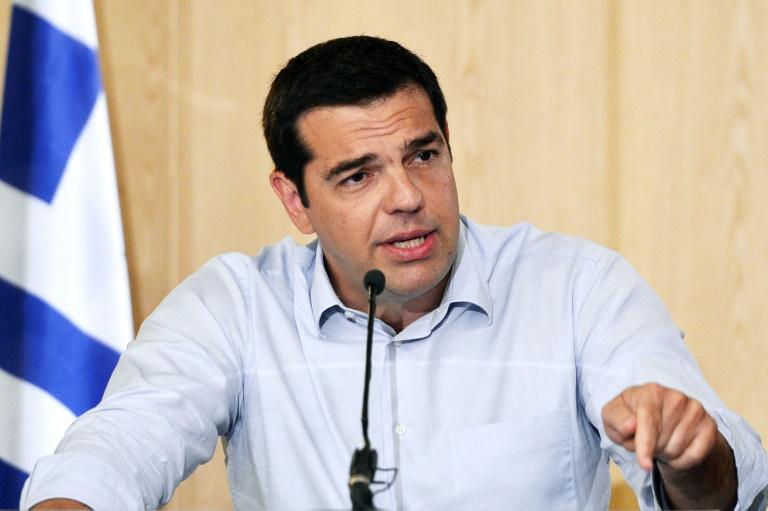
Greek PM confident of bailout deal backing
"I am and remain confident that we will succeed in reaching a deal and loan support (from the European Stability Mechanism)... that will end economic uncertainty," Tsipras said, adding that certain EU states had a "hidden plan to reshape the eurozone using Greece as the excuse" that would fail.
"Greece will not give them the excuse," the 41-year-old premier said in an apparent swipe at Germany, which on Wednesday said it needed more time to comb through the 400-page text setting out the fiscal and other policy measures Greece must take in exchange for the lifeline.
Greece and its creditors are under pressure to finalise the deal by next Thursday when Athens must repay some 3.4 billion euros ($3.8 billion) to the European Central Bank.
A Greek government source said Tsipras had requested an emergency session of parliament for Thursday -- with all lawmakers required to attend -- for a crucial vote on ratifying the deal.
Eurozone finance ministers will then meet Friday to give their verdict on the deal, the spokesman for Eurogroup President Jeroen Dijsselbloem said on his Twitter account.
The German finance ministry said it had "formulated questions" about the draft agreement to be discussed at the Brussels meeting.
- Tumbling into recession -
Separately, EU sources said Greece will tumble back into deep recession this year and the next.
The Greek economy, which crawled out of a six-year recession only in 2014, will shrink 2.3 percent in 2015 and another 1.3 percent in 2016, the sources said.
Growth should then return, running at 2.7 percent in 2017 and 3.1 percent in 2018, they said.
Greece has repeatedly complained that the austerity measures demanded by its creditors -- the EU, the ECB and the International Monetary Fund -- in return for two previous bailouts have only hurt an economy that has contracted by a quarter since the crisis broke.
The latest rescue package calls for a gas market overhaul, ends most early retirement schemes, eliminates fuel price benefits for farmers and raises some taxes, among other measures.
The government said Greek banks -- which were forced to shut down for three weeks as panicked customers withdrew billions of euros, fearing for the safety of their deposits -- would immediately receive 10 billion euros from the package, and will be fully recapitalised by the end of the year.
The draft deal comes after months of acrimonious negotiations between the creditors and Greece's left-wing government, which came to power in January promising an end to years of painful austerity demanded in exchange for the cash.
Investors reacted with relief to news of the outline deal, with shares in Athens closing Tuesday 2.14 percent higher for a fourth straight day of gains.
But the positive run ended on Wednesday with the ATHEX index closing 1.93 percent down.
- Still no certainty -
An EU source stressed it was still not certain that the bailout would be finalised by next Thursday's ECB payment deadline -- leaving open the possibility that Athens might need a few days of emergency funding.
"In that case, we need all the member states" to approve such a loan, the source added, posing a potential fresh headache for negotiators.
Finnish Finance Minister Alexander Stubb -- one of the hardliners on the bailout accord -- told AFP Wednesday that his country "won't just swallow an announcement that an agreement has been reached" and would go through the details.
Tsipras is under pressure from many hardliners in his radical left Syriza party who say the new accord will pile further austerity on a weakened economy and goes against the party's campaign pledges. He suffered a major mutiny by Syriza members in two previous votes on the bailout.
The embattled prime minister has warned that he may be forced to call early elections if the dissent continues.
An analyst at Capital Economics urged caution over the deal, saying: "While Greece appears finally to be on the verge of receiving a third bailout, the extremely optimistic economic and fiscal projections underlying the plan suggest that it might not last for very long."
Tsipras' former finance minister Yanis Varoufakis concurred.
"Ask anyone who knows anything about Greece's finances and they will tell you this deal is not going to work," Varoufakis told the BBC's World at One.
Greece on Wednesday also raised 1.138 billion euros in three-month treasury bills at a steady interest rate of 2.7 percent.

Legal Disclaimer:
MENAFN provides the
information “as is” without warranty of any kind. We do not accept
any responsibility or liability for the accuracy, content, images,
videos, licenses, completeness, legality, or reliability of the information
contained in this article. If you have any complaints or copyright
issues related to this article, kindly contact the provider above.

















Comments
No comment